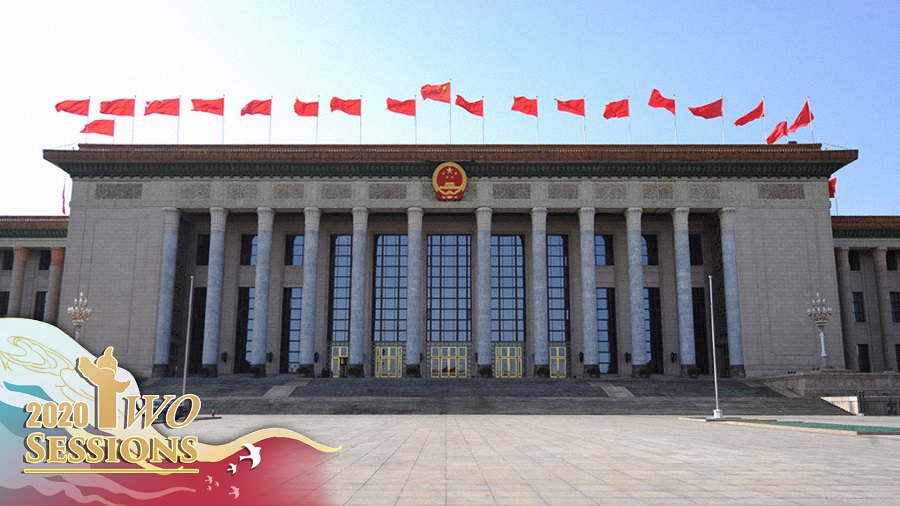China’s top political advisory body to hold annual session from May 21 to 27

Beijing|2020-05-20 Wednesday(CGTN)
The National Committee of the Chinese People’s Political Consultative Conference (CPPCC), the country’s top political advisory body, held a press conference on Wednesday afternoon, ahead of the top political advisory body’s annual session.

Guo Weimin, spokesperson for the third session of the 13th CPPCC National Committee, briefed the media on the session and took questions through video conference amid COVID-19 pandemic.
What’s are the new arrangements for this year’s session?
The annual session of China’s top political advisory body will start at 3 p.m. on Thursday in Beijing after a two-month-plus delay due to the coronavirus pandemic, and end on May 27 – four-and-a-half days shorter than previously planned.
Except for the opening and closing meetings, this year’s session includes two plenary meetings, one of which will be convened via video, as well as six group meetings.
With regard to media coverage, some Beijing-based Chinese and foreign journalists will be invited to the Great Hall of the People for interview while there will be no group interviews for group meetings.
Three corridor interviews of CPPCC members will be conducted via online video and journalists are welcome to interview by video or in writing, Guo said.
CPPCC’s role in COVID-19 response
At this year’s meeting, CPPCC members represent wide cross-sections of society and many of them have taken part in China’s COVID-19 response, Guo told reporters, saying all political advisers and CPPCC organizations at all levels have played a positive and important role.
The political advisory body has also worked for improving the public health emergency response by conducting video conferences, online workshops and seminars to discuss key issues emerged during the pandemic and offer advice including the strengthening of the construction of specialized hospitals for infectious diseases and expert teams.
Two Sessions 2020: What’s special this year?
China’s long-awaited Two Sessions, which was delayed by COVID-19 for over two months, is finally about to draw its curtain in Beijing on Thursday, as the country is returning to normalcy following the pandemic.
The year of 2020 is especially important as it marks the last year of China’s thirteenth Five-Year Plan (2016-2020) , the final year for China to build a moderately prosperous society in all aspects, and reach its goal to eliminate absolute poverty.
How to overcome the challenges posed by the virus and reach China’s set goals will top the agenda of the annual sessions of the Chinese People’s Political Consultative Conference (CPPCC) National Committee, the top advisory body and the National People’s Congress (NPC), the country’s top legislature.
Post-pandemic policies
The outbreak of COVID-19 has brought China great losses. However, under the Chinese people’s painstaking efforts and enormous sacrifice, the situation is under control, and both the economy and people’s lives are returning to normal.
The Two Sessions have been delayed for two months because of the COVID-19 pandemic, so global public health issues shall be the main topic, said Fu Jun, professor of political economy and public policy, and academic dean of the Institute of South-South Cooperation and Development (ISSCAD).
The participants are expected to discuss experiences and lessons learned in the fight against COVID-19, how to seek economic and social development while implementing regular epidemic prevention and control measures, as well as improve China’s overall emergency warning and reporting system.
As of Tuesday, the CPPCC has received nearly 300 proposals related to the epidemic response from political advisers.
Growth target
China’s economy is undergoing unprecedented challenges and difficulties due to the pandemic. The GDP growth target to be set on Friday’s work report and issues including employment, income, and people’s livelihood are the topics to be closely watched.
Dr. Zhao Hai, a research fellow at the Chinese Academy of Social Sciences, said the central government changed its economic goal from a fixed target to a target range. Given the impact of the pandemic, it is very difficult to predict the ultimate growth rate of the country’s economy.
Zhao said China has been facing not only domestic economic pressure but also uncertainties from around the world. Therefore, the current focus of the government is to maintain economic stability.
He added that the government has already launched policies to ensure protection and stability in six key areas, including employment, supply chain, people’s livelihood, and food security.
Ending absolute poverty
Another area to watch closely is poverty alleviation. China is in the final push to achieve the target of eliminating “absolute poverty” by 2020. Despite the virus, China’s goals and tasks in this area remain unchanged.
Read more: China vows to eliminate poverty as planned despite COVID-19
The country’s poverty alleviation tasks are near completion, as the number of impoverished people fell to 5.51 million at the end of 2019 from 98.99 million at the end of 2012 and the number of poverty-stricken counties fell to 52 in 2020.
Zhao pointed out that the poverty reduction process should be a long-term goal. In 2020, because of the coronavirus, some people lost their jobs, which might push them back into poverty. Therefore, poverty alleviation will continue to be the priority of the Chinese government.
During the sessions, participants are expected to discuss how to fulfill the tasks of ending absolute poverty and keep those who have been lifted out of poverty from falling back into it.
Civil code
China is getting closer to having the long-expected civil code, as the draft will be submitted to the annual session of the NPC for final deliberation.
With 1,260 articles, the draft is the most extensive legislation in China, as well as the only legislation officially named as a “code.”
A civil code is an “encyclopedia of people’s lives.” It is the most important law covering the private sphere and deemed to be the “civil constitution” of modern society.
China’s draft civil code consists of seven books, including general provisions and sections on property, contracts, personality rights, marriage and family, inheritance, and torts.
“Incorporating personality rights provisions into an independent section is a major innovation,” Shi Jiayou, a professor from Renmin University of China and executive director of the National Research Center of Civil and Commercial Law, told CGTN.
Response to COVID-19 blame game
As the pandemic is spreading wildly around the globe, China is facing mounting political pressure as some countries are working furiously to frame Beijing as the original culprit and use China as a scapegoat for their missteps.
China was the first victim hit by the first wave of the virus. Despite the unprecedented challenge, China responded quickly and decisively and acted with openness, transparency, and responsibility in the fight against COVID-19.
“We need to replace differences with unity, eliminate prejudice with reason, overcome difficulties in the spirit of a community with a shared future for mankind, strengthen international cooperation, and solve global problems and challenges. These are our basic principles in dealing with the current international relations,” said Zhanbin Zhang, head professor of the Marxist School of the Party School of the Central Committee of the Communist Party of China.
“The more complex the external environment, the more important it is to improve yourself,” said Zhang.
He predicted that the participants of the Two Sessions will discuss how to maintain the overall situation of China’s opening to the outside world, further promote a stable foreign policy, continue to provide China’s proposal for building a community with a shared future for mankind, and tell a good story of China to create a sound environment for international opinion.










